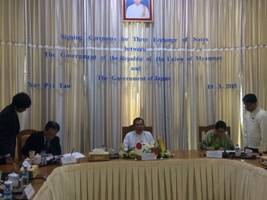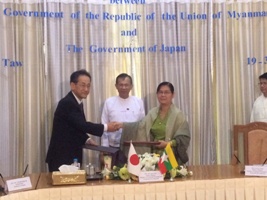
Japan Grants a total of US$72.85 million for 7 Grant Projects towards Infrastructure Development and Ethnic Group Assistance in Myanmar
March 19, 2015
On Thursday, 19 March, exchanges of notes took place concerning 7 grant aid projects worth a total of 8.743 billion Japanese Yen or approximately 72.85 million US Dollars in Nay Pyi Taw. Included are three projects which focus on assisting the development of infrastructure in Myanmar in order for Myanmar to continue sustainable economic growth and achieve a raised living standard for its citizens. Also included are four projects through which the Government of Japan will team up with various UN agencies in delivering essential assistance to ethnic groups and other vulnerable populations in Myanmar.1. Assistance to develop infrastructure and raise living standards for sustainable economic growth
H.E. Mr. Tateshi Higuchi, Ambassador Extraordinary and Plenipotentiary of Japan to the Republic of the Union of Myanmar, and H.E. Daw Lei Lei Thein, Deputy Minister for National Planning and Economic Development of the Republic of the Union of Myanmar exchanged notes concerning the following three projects:
(1) The Project for Port EDI for Port Modernization
(Grant amount total: JPY1.72 billion or approx. USD14.33 million)
Yangon Port (including the Thilawa area), which is the biggest cargo port in Myanmar, has been conducting various procedures through inefficient measures such as physical applications or primitive electronic applications, leading to longer waiting time for the cargo and lost profit through the waiting time. This project aims to implement methods for electronically processing (Port Electric Date Interchange) of various applications and permits concerning port management such as those related to incoming and outgoing vessels. The project will lead to a more streamlined process, facilitating logistics and a modernized port administration. We hope this will contribute to a sustainable economic growth of Myanmar.
(2) The Project for Improvement of Water Supply System in Mandalay City
(Grant amount total: JPY2.555 billion or approx. USD21.29 million)
Mandalay, which is the second largest city in Myanmar’s central region, has had a disparity in the level of installation of water supply systems between its northern and southern areas. In southern Mandalay where the coverage rate of water supply is extremely low, the influx of residents and the increasing construction of commercial facilities have left many of the residents in poor health and hygiene environments, using unsanitary shallow wells. Even in northern Mandalay where water supply systems construction is fairly underway, there are not enough disinfectant treatment of water for ample safe drinking water supply. This project aims to install water supply systems in the low income areas in southern Mandalay where there is a sharp growth in the demand for water, as well as install chlorination facilities in preexisting water supply systems in Mandalay, leading to the improvement of the living and health environment of the local residents, contributing the improvement of livelioods in Myanmar.
(3) The Project for Reduction of Non-Revenue Water in Mayangone Township in Yangon City
(Grant amount total: JPY2.106 billion or approx. USD17.55 million)
Yangon, Myanmar’s former capital, has seen an increase in the demand for tap water due to increasing residents and economic development. This has led to the acute necessity to develop new water sources as well as to tackle the issue of non-revenue water (water which does not lead to revenue, such as leaked water), although measures such as upgrading water pipes or continuous maintenance has not been taken enough. This project will install waterworks related facilities in Mayangone Township, Yangon, where the problem is most severe, and through its implementation including facility management, aims to decrease the water leakage rates, leading to improved water supply and non-revenue water reduction capability. This project, including investment and management of the facilites, is anticipated to be implemented by Japanese private firms, as it has been approved as a “Public Private Partnership to Boost Economic Growth” Project proposed by Japanese private firms.

|

|
Although efforts towards peace have been ongoing between the government and ethnic groups, Myanmar has seen an increased number of refugees and internally displaced persons (IDPs) due to clashes such as the rioting in Rakhine in March 2014 and the conflict between the government and armed ethnic groups in Kachin in April 2014, as well as natural disasters such as floods and landslides resulting in unexpected displacement. In order to prevent situations from taking a turn for the worse and consolidate the national peacebuilding process, it is essential that necessary assistance measures be taken towards ethnic minority regions which still fall behind on development and therefore are vulnerable to natural disasters and instability.
In order for Japan to contribute to such efforts, H.E. Mr. Tateshi Higuchi, Ambassador Extraordinary and Plenipotentiary of Japan to the Republic of the Union of Myanmar and representatives from the respective UN agencies (Mr. Domenico Scalpelli, Country Director and Representative, WFP Myanmar, Mr. Bijay Karmacharya, Country Programme Manager, UN-Habitat Myanmar, Mr. Aaron Greenberg, Deputy Country Representative a.i., UNICEF Myanmar, and Mr. Giuseppe Vincentiis, Country Representative, UNHCR Myanmar) exchanged notes concerning the following four projects:
(1) The Programme for Emergency Food Assistance in Ethnic Minority Areas
(Grant amount total: JPY1 billion or approx. USD8.33 million)
This Programme will be implemented through the World Food Programme, assisting food towards displaced persons in Rakhine, Kachin and northern Shan States. The project aims to improve the nutrition status of the displaced persons, contributing to the improvement of their livelihoods.
(2) The Programme for Emergency Assistance to Poor and Vulnerable Community in Ethnic Minority Areas and Yangon
(Grant amount total: JPY631 million or approx. USD5.25 million)
This Programme will be implemented through UN-Habitat, assisting community infrastructure development and improvement of the living environment towards low income households in Kachin and Shan States as well as Yangon. The project aims to prepare a better living environment for the vulnerable population in the target communities.
(3) The Programme for Emergency Assistance to Children in Ethnic Minority Areas
(Grant amount total: JPY452 million or approx. USD3.76 million)
This Programme will be implemented through UNICEF, providing health, medical, education, and protective services to children and expectant or lactating mothers in refugee camps in Rakhine, Kachin and northern Shan States. The project aims to protect these vulnerable populations from health or violence risks, contributing to the improvement of their living environment.
(4) The Programme for Assistance to Displaced Persons in Ethnic Minority Areas
(Grant amount total: JPY279 million or approx. USD2.32 million)
This Programme will be implemented through UNHCR, providing for setting up and managing of shelters and camps for refugees in Rakhine, Kachin and northern Shan States. This project aims to improve the living conditions at the camps and the surrounding community, contributing to the improvement of livilihoods in the region.

 No.100 Natmauk Road, Bahan Township, Yangon
No.100 Natmauk Road, Bahan Township, Yangon
 01-549644~8
01-549644~8